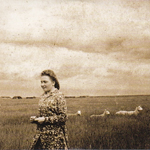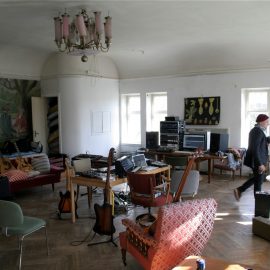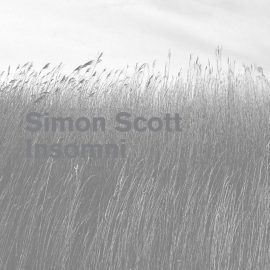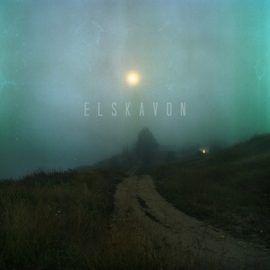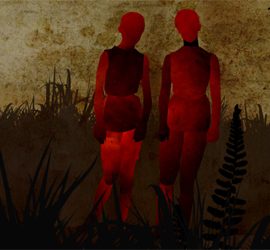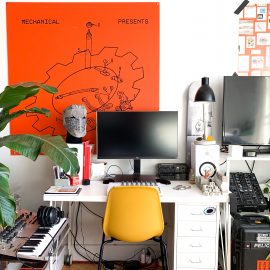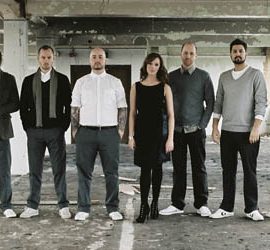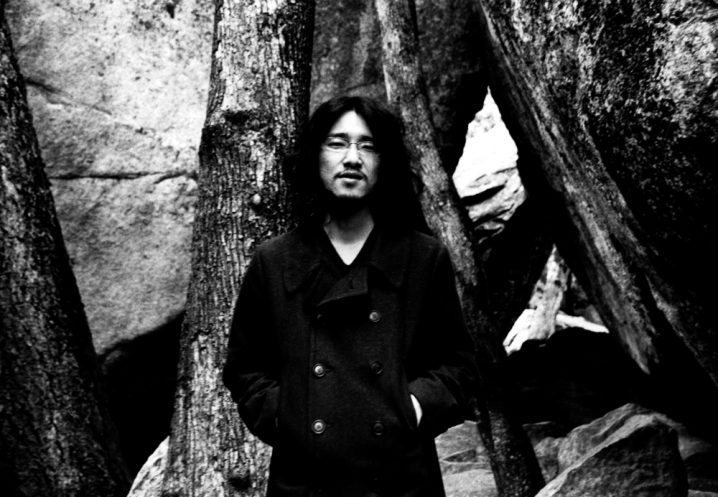
How did you first get in touch with music?
At first I was interested in the music that my parents were listening to in their car – the Beatles. In high school I started playing the guitar and started a band. Initially I was playing trash metal, bands like Metallica and Slayer. While I was studying at the university, I got the chance to see Mixmaster Morris, the British ambient DJ, so that is how I was introduced to this genre around ’97. After this experience I really got into ambient and post-rock, artists like Tortoise, Jim O’Rourke, Can and Neu! of the 70s. I formed a band once again, but this time the improvisations were influenced by German krautrock, and I was playing the guitar from an ambient approach. I left the band after two years, and have been making music alone since 2001. In the beginning I was using an old Yamaha sequencer and sampler, and then I bought a Macintosh PowerBook and began using Max/MSP. I met Tomoyoshi Date (of Opitope) in 2012 and we have been collaborating occasionally since then.
Japanese ambient music is considered to be special to an almost irreproducible point. What do you think it makes it so different, so ‘authentic Japanese’?
When you are on the inside of it, Japanese ambient music does not seem to be that special. I have been, since my very childhood, influenced on an unconscious level by traditional Japanese culture like Japanese gardens and tea ceremony. It’s lovely to see that Japanese ambient music has been accepted, but actually we work on a very small scale. I think that John Cage’s fascination with Zen Buddhism also influenced his work, and therefore promoted the world’s interest in Japanese music scene, but I think that it might have also brought some misunderstandings. Looking back at the history of Japan, I think the formation of the Tokugawa shogunate, the last feudal Japanese military government which existed between 1603 and 1868, played a very major role – the country was for a prolonged time ruled by warriors who had no need to go to war anymore, and this existential twist formed the base of aesthetics of today’s Japanese culture.
How is the ambient music scene in Tokyo? There must be something going on all the time…
The ambient music scene in Tokyo is growing each year, although it also feels that not much has changed. Instead of having live performances in venues, it is more popular to have them in temples and churches and outdoors as it seems that it is easier to gather an audience that way. When you are listening to music, you want to experience it in a special environment. Also a lot of small events with not more than couple dozen people are taking place. In addition, musicians from abroad, such as Celer, Jim O’Rourke and others have moved to Tokyo and this gives more depth to the Tokyo music scene. Unfortunately the whole thing is becoming increasingly fragmented – events and other information are not promoted and communicated well enough among different ambient music communities. I don’t think this problem exists only in music, though…
In 2010 you’ve launched your own label White Paddy Mountain and started out with releasing your own albums at first, but then recently you also gave space to artists such as Shelling, Asuna or Machinefabriek. How did you get the idea to set up your own label for your own music, then how come you have decided to let others ‘join’ as well?
Initially, around 2008 there was a plan to launch a label with Opitope’s Tomoyoshi Date. The idea was to release Opitope albums (we are now releasing albums on the White Paddy Mountain label). That didn’t quite work out at first, there was a long standstill. In the meantime I started a label called NYAMMA in 2010 with another friend; we released some quite strange avant-garde pop music from a girl band called K’DLOKK. The activities of NYAMMA ended with that one project, so that was when I decided to launch White Paddy Mountain. First we did digital releases only, then we released our first CD in 2013 (Shelling: ‘Shelling’). It is rather difficult to decide what to release from other artists, but we try to choose records that we would like to be heard all over the world. Our main target is still the Japanese market, so the artists we choose are naturally mostly Japanese. However, since there are so many talented Japanese artists, I have this impulse to introduce them overseas as well, which is also a challenge, to push the limits in the future.
What is your experience of releasing music from Japan? Do you find it harder to get noticed/heard due to the geographic/language barrier?
I have always felt the existence of a language barrier and I think I can speak for other Japanese artists as well. Also, I have times when I think that the geographical barrier is even larger, which is why I would like to go on tours more often.
How do you achieve that immense level of calmness in your music? Do you have any rituals or methods that help you compose?
Usually I try to finish something to a satisfactory level, and then I have to listen to it over and over again. When you are re-listening to your work for a few times after 2-3 days since the recording, you realize that some things are not as good as you initially thought they were. This means that when I am mixing, I often remove large chunks from a song until it becomes a completely different piece of music. As for composing methods, I have several patterns. Improvisation with guitar and other instruments, improvisation with synthesizers. When I have enough recorded material, I process it with the help of software and pedal effects, loop pedal, guitar pedal, mixer etc. Also, I adjust the pitch of the files using digital audio editing software. Adjusting the pitch is more complicated than it seems, depending on the software different overtones are emphasized and, by adding reverb or delay, it can be varied considerably.
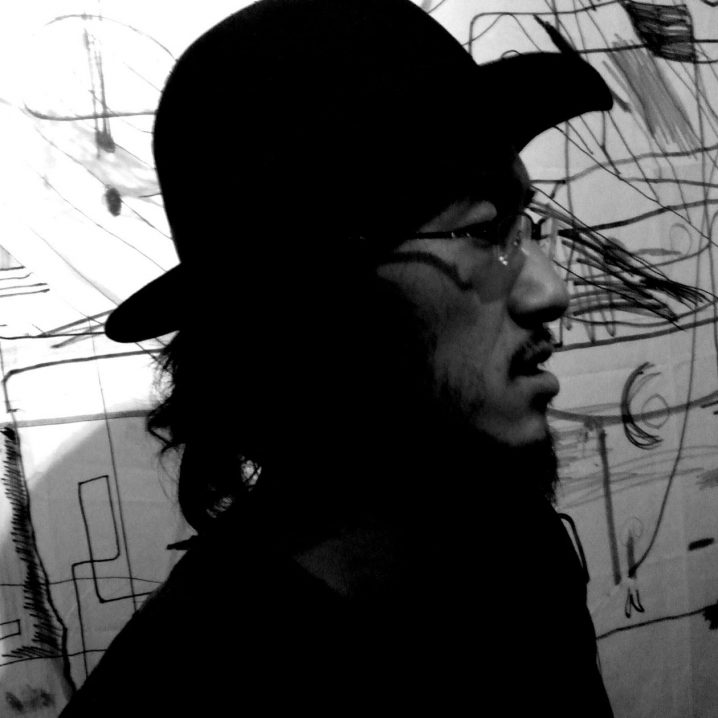
Unlike Tomoyoshi Date – your partner from Opitope – you prefer working alone, concentrating on your solo material. Is there any specific reason why you haven’t been involved in too many collaborations?
Tomoyoshi really loves recording sessions, so he releases lots of collaboration albums. There is an enormous amount of Opitope music that we haven’t even released yet. Editing is kind of hard and time-consuming, so it’s all sleeping in the back of my hard drive disk now… I thought I would release an album from our last session, but it’s not going to happen anytime soon. This session exists as an experience in my own music, and for now I think that’s enough. I have really intense experiences when working alone, stronger feelings when I am exploring my own sounds. It’s not quite the same when I am collaborating with someone, although I plan to do more collaborations in the future. Yet another reason is that my music is influenced by books I read and paintings I see, maybe that’s why I prefer to work alone.
You’ve amassed a huge discography in a relatively short period of time, are you concerned about releases going unnoticed due to your high productivity level?
Yes, that is a large amount of music, but I always come up with new ideas during the recording process that I want to use in my next record, and I want to try them out immediately. Maybe in the future I will use another stage name or split the releases into series.
Do you ever listen to your old releases, if so do you still enjoy them?
Once they are released, I rarely listen to them, because I have listened to them many times during the recording process. Maybe from time to time I re-listen to make sure that it was a good record. I find it difficult to listen to my own work again. It feels like a ghost of myself from the past appears suddenly and taunts me. Since I have so much mastering and label work these days, time to make music has decreased. Therefore the time when I can actually make music is very important and a very happy time for me. When I think about it, it’s the process of creating music that I really like the best. It’s really interesting to watch how music gradually changes and takes shape. Although I am the composer, I think that I am at the same time an observer as well.
Your music has evolved a great deal over the years, yet you’ve always maintained a strong aesthetic which is very much your own, where do you see it going next?
Recently, I am always working on many projects, but after finishing them I would like to return to working on only one thing at a time. As to why I ended up working on all those projects simultaneously – I think the Great East Japan Earthquake influenced me a lot. On that day I was in a bookstore on the 8th floor of an old building when all of a sudden everything started to shake. Before I had any time to reflect on what was going on, I was already running down the stairs. Then I saw a large public TV monitor in Shinjuku and, standing together with other bewildered evacuating Tokyoites, watched the people and the buildings being washed away by the tsunami in real-time. Thinking about my own helplessness brought on very painful feelings… those were further strengthened by the accident which happened subsequently in the nuclear power plant. If I think about the last two years after this, I still don’t think that my mood ever got back to normal. Now that some time has passed, I am re-organizing my thoughts and trying to work more on the releases of recordings that I made immediately after the tsunami. I also traveled to Turkey 3 years ago where I made plenty of field recordings, I am now working on an album that utilizes those field recordings, and I would like to complete it soon. After I’ve done that, I would like to experiment with new forms using drone. Or, if I have enough time, work on something other than just music. Images or something that uses sounds and light.
What is it about ambient music that keeps you so engaged and committed to it?
That’s a really very deep question… I could talk about it for hours. I saw David Toop say on his talk show recently: “Most people think that ambient music began with Brian Eno, but I know it’s not true”, which I thought was interesting. Speaking of Brian Eno, his activities with Obscure Label, a label he had before he invented ambient music, are quite noteworthy. It showed signs of attempting to make contemporary music more listenable to the general public, released some really good albums, including some albums the concepts of which were way beyond their era. I personally love Brian Eno’s album ‘Apollo’, but it has places and moments that differ from the concept of ambient music later put forward by Eno himself. I think that the origin of the concept of ambient music was influenced by the scenes of contemporary music of mid-70s and instrumental improvisation music, so I am interested in those as well. The concept of ambient music has many possible applications, however, lately in Japan there is a trend to apply it to anything, which, on one hand, might be good, but on another hand, feels weird and leads to misunderstandings. Ambient music differs from the notions of hip-hop, reggae, blues, metal, noise etc. In hip-hop you can find pieces that can be interpreted in an ambient-like manner, the same applies to reggae and folk music. In short, I think ambient music is not a genre. It can be found everywhere and anywhere, which I think is its most fascinating aspect. In this sense, it is possible to think that it does not exist as a specific genre. As a composer, I try not to have a particular awareness or ambition to “make ambient music”.
Who do you think the most impressive ambient artists are these days?
Ken Ikeda. He is making ambient music using just intonation from, for example, Yamaha DX7 synthesizer, and also utilizing self-made noise instruments. There is a lot to be learned from this sincere attitude. He makes very complex and sophisticated music, but as it at times difficult to comprehend, he is often misunderstood.
When you’re not working with and listening to ambient, what other types of music do you prefer, what other artists do you like?
I often listen to old recordings of traditional folk music. The songs of mine workers of Nepal, music of Southeast Asia, India, Africa and so on. I like improvised music, experimental music, older electronic music, field recordings and female vocals. Recently I am really into the latest album by Vashti Bunyan, Josephine Foster, and Grouper. I also listen to Brazilian music – Lo Borges, and the late works of Alice Coltrane. I like her because she mixes synthesizers with gospels, spirituals, and jazz, and her melodies are very beautiful. The late works are difficult to obtain because they were released only on tape, so recently I’ve been downloading the analogs from YouTube into my audio mastering system and having fun with remastering them myself. Only very recently I’ve become a fan of the piano works of Erik Satie. I listen to them little by little, and every time there are new discoveries for me to make. That’s the genius of Satie. I’ve also gotten interested in experimental minimal techno and beat, the kind that is sold on Boomkat. If I start giving you names there’ll be no end to it. Boomkat has a lot of good stuff.
